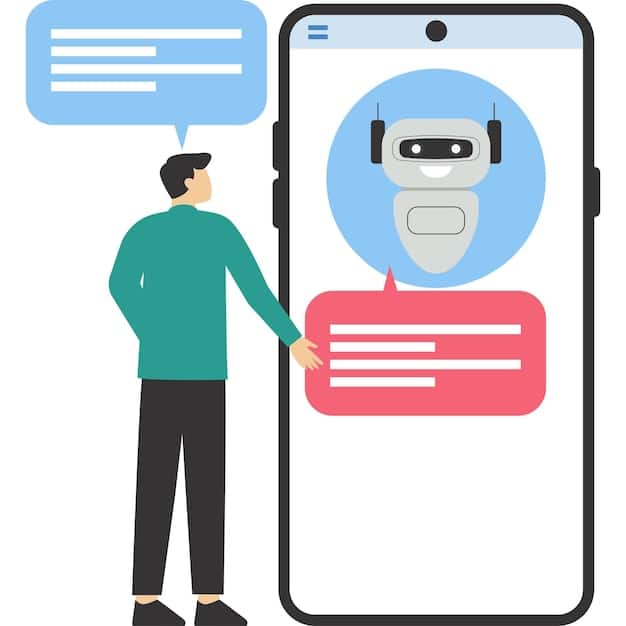AI for Small Businesses: Affordable Productivity Solutions in the US

AI for Small Businesses: Affordable Solutions to Boost Productivity in the US offer a range of tools and strategies to automate tasks, improve decision-making, and enhance customer experiences, helping small businesses compete effectively and achieve sustainable growth.
AI for Small Businesses: Affordable Solutions to Boost Productivity in the US
In today’s competitive landscape, small businesses in the US are constantly seeking ways to enhance productivity and efficiency. AI for Small Businesses: Affordable Solutions to Boost Productivity in the US offer a wide array of tools and strategies that can transform operations and drive growth.
Understanding the Potential of AI for Small Businesses
Artificial intelligence (AI) is no longer a technology reserved for large corporations. Today, even the smallest businesses can harness the power of AI to streamline processes, gain insights, and improve customer satisfaction. Understanding the potential of AI is the first step toward unlocking its benefits.
What is AI and How Can It Help?
AI refers to the simulation of human intelligence in machines that are programmed to think, learn, and solve problems. For small businesses, this translates to automating repetitive tasks, providing data-driven insights, and enhancing customer interactions.
AI can help with:
- Analyzing large datasets to identify trends and opportunities.
- Automating customer service interactions through chatbots.
- Improving marketing campaigns with personalized recommendations.
- Optimizing supply chain management.
Common AI Applications in Small Businesses
Several AI applications are particularly beneficial for small businesses. These include:
- Customer Relationship Management (CRM): AI-powered CRMs can automate data entry, personalize customer interactions, and predict customer behavior.
- Marketing Automation: AI can automate email marketing, social media posting, and ad campaigns, ensuring that the right message reaches the right audience at the right time.
- Data Analytics: AI tools can analyze financial data, sales figures, and marketing metrics to provide actionable insights that drive decision-making.
- Chatbots: AI-powered chatbots can handle customer inquiries, provide support, and resolve issues 24/7, improving customer satisfaction and reducing workload for human employees.
Understanding the diverse applications of AI helps small businesses identify where these tools can make the most significant impact.
In conclusion, grasping the potential of AI involves understanding its basic principles and recognizing various applications that can be tailored to meet specific business needs.
Affordable AI Tools for Boosting Productivity

One of the biggest misconceptions about AI is that it’s expensive and inaccessible for small businesses. However, numerous affordable AI tools are available that can significantly boost productivity without breaking the bank. These tools cater to various business functions, making AI adoption feasible for any small business.
AI-Powered CRM Systems
Customer Relationship Management (CRM) systems are crucial for managing customer interactions and streamlining sales processes. AI-powered CRMs take this a step further by automating tasks and providing intelligent insights.
Popular affordable AI-powered CRM options include:
- HubSpot CRM: Offers free and paid plans with AI features for lead scoring, email tracking, and sales automation.
- Zoho CRM: Provides a comprehensive suite of AI tools for sales, marketing, and customer support, with options suitable for small budgets.
- Pipedrive: Offers AI-driven sales automation and lead management features at competitive prices.
AI Marketing Automation Platforms
Marketing automation platforms powered by AI can enhance marketing efforts by personalizing content, automating campaigns, and analyzing performance.
- Mailchimp: Integrates AI for email marketing automation, including personalized product recommendations and predictive segmentation.
- ActiveCampaign: Offers AI-driven features for email marketing, CRM, and automation, with plans designed for small businesses.
- Sendinblue: Provides AI-powered tools for email marketing, SMS campaigns, and chat, with affordable plans for startups and small businesses.
Using AI for Financial Management
Effectively managing finances is critical for small businesses. AI tools can automate bookkeeping, generate financial reports, and provide insights into cash flow.
Affordable AI solutions for financial management include:
- QuickBooks Online: Integrates AI features for automated invoice processing and expense tracking.
- Xero: Provides AI-driven bank reconciliation and financial reporting tools.
- FreshBooks: Offers AI-powered features for automated expense tracking and invoicing.
By leveraging these affordable AI tools, small businesses can significantly improve their productivity and streamline operations without overspending.
Implementing AI: A Step-by-Step Guide for Small Businesses
Implementing AI can seem daunting, but with a structured approach, small businesses can successfully integrate these technologies into their operations. A step-by-step guide ensures that AI adoption is smooth, effective, and aligned with business goals.
Step 1: Identify Key Pain Points
The first step is to identify the specific areas where AI can provide the most benefit. Look for processes that are time-consuming, repetitive, or prone to errors. Common pain points include:
- Inefficient customer support.
- Time-consuming data entry.
- Poor marketing campaign performance.
- Lack of actionable insights from data.
Step 2: Choose the Right AI Tools
Once you’ve identified your pain points, research and select AI tools that address those specific needs. Consider factors such as cost, ease of use, integration with existing systems, and customer support.
Step 3: Pilot Projects and Testing
Before fully implementing AI across your business, start with small pilot projects. This allows you to test the effectiveness of the tools, identify potential issues, and gather feedback from employees.
For example:
- Implement an AI-powered chatbot on your website to handle basic customer inquiries.
- Use AI-driven data analytics to identify trends in sales data.
- Start with one department to test effectiveness.
Step 4: Train Your Team
AI tools are most effective when employees know how to use them properly. Provide training to your team to ensure they understand the features, benefits, and best practices for using the AI tools.
Step 5: Monitor and Optimize
AI implementation is an ongoing process. Continuously monitor the performance of your AI tools, gather feedback from employees, and make adjustments as needed to optimize their effectiveness. Regularly evaluate whether tools are meeting the business’s pain points and improve the process if necessary.
- Track key performance indicators (KPIs) to measure the impact of AI.
- Adjust settings and configurations to improve performance.
- Look for new ways to leverage AI in your business.
Following these steps ensures that AI implementation is strategic, manageable, and delivers tangible results for your small business.
AI in Customer Service: Enhancing Support and Satisfaction
Customer service is a critical aspect of any business. AI can revolutionize customer service by providing instant support, personalizing interactions, and resolving issues more efficiently. Embracing AI can lead to higher customer satisfaction, improved loyalty, and reduced operational costs.
Benefits of AI-Powered Customer Service
- 24/7 Availability: AI chatbots can provide instant support around the clock, ensuring that customers can get help whenever they need it.
- Personalized Interactions: AI can analyze customer data to personalize interactions, providing tailored recommendations and support.
- Faster Response Times: AI can quickly answer common questions and resolve basic issues, reducing wait times for customers.
Real-world uses of AI powered customer service can bring real growth to your business.
- Improved Efficiency: By automating routine tasks and answering common questions, AI frees up human agents to focus on more complex issues.
- Cost Savings: AI can reduce the need for large customer service teams, resulting in significant cost savings.
Implementing AI Chatbots
AI chatbots are one of the most popular applications of AI in customer service. These virtual assistants can handle a wide range of tasks, from answering FAQs to guiding customers through complex processes.
Tips for implementing effective AI chatbots:
- Define Clear Goals: Determine what you want your chatbot to accomplish, such as answering FAQs, providing product recommendations, or resolving support issues.
- Provide Comprehensive Training: Train your chatbot on a wide range of topics and scenarios to ensure it can handle a variety of customer inquiries.
- Monitor Performance: Continuously monitor the chatbot’s performance and make adjustments as needed to improve its accuracy and effectiveness.
- Integrate Human Support: Ensure that customers can easily escalate to a human agent if the chatbot is unable to resolve their issue.

AI has enhanced call center intelligence: The use of AI-powered analytics to monitor customer interactions and identify areas for improvement. This can help businesses optimize their customer service processes and provide better support.
By leveraging AI in customer service, small businesses can enhance support, improve customer satisfaction, and gain a competitive edge.
AI for Marketing and Sales: Personalized Strategies for Growth
Marketing and sales are essential for driving revenue and expanding your customer base. AI can transform these functions by personalizing marketing campaigns, optimizing sales processes, and providing valuable insights into customer behavior. By using AI in these functions, businesses can improve customer retention.
Personalized Marketing Campaigns with AI
AI can analyze customer data to create personalized marketing campaigns that resonate with individual customers. This can lead to higher engagement rates, improved conversion rates, and increased revenue.
Strategies for implementing personalized marketing campaigns with AI:
- Segment Your Audience: Use AI to segment your audience based on demographics, interests, and behavior.
- Personalize Content: Create personalized email campaigns, website content, and product recommendations based on each customer’s unique preferences.
- Optimize Timing: Use AI to determine the best time to send marketing messages to each customer.
Using AI to Optimize Sales Processes
AI can streamline sales processes by automating tasks, providing lead scoring, and predicting customer behavior.
Benefits of using AI to optimize sales processes:
- Automated Lead Scoring: AI can score leads based on their likelihood to convert, allowing sales teams to focus on the most promising prospects.
- Predictive Analytics: AI can predict customer behavior, such as when they are likely to make a purchase or churn.
- Sales Automation: AI can automate tasks such as data entry, follow-up emails, and appointment scheduling.
- Chatbot Integration: Chatbots aren’t just for Customer Service! They can also gather leads and help with simple Sales tasks.
How AI can create Sales Reports
Use AI driven analytics to generate reports based on data collected by the new AI structure. AI can offer benefits such as:
- Automated Report Generation: AI can create automated reports that provide insights into sales performance, marketing campaign effectiveness, and customer behavior.
- Sales Forecasting: AI can analyze historical data and market trends to forecast future sales performance.
- Performance Tracking: By using AI, sales teams can track individual milestones from employees or other individuals important to the sale.
By harnessing the power of AI in marketing and sales, small businesses can drive growth, increase revenue, and gain a competitive advantage.
Data Security and Ethical Considerations
As small businesses increasingly rely on AI, it’s essential to address data security and ethical considerations. Protecting customer data, ensuring fairness, and maintaining transparency are crucial for building trust and avoiding potential risks. Failing to incorporate these elements can cause significant failures involving GDPR/CCPA violations and more.
Protecting Customer Data: Cybersecurity Measures
AI systems rely on vast amounts of data, making them potential targets for cyberattacks. Implement robust cybersecurity measures to protect customer data and prevent data breaches.
Essential cybersecurity measures include:
- Data Encryption: Encrypt sensitive data to protect it from unauthorized access.
- Access Controls: Implement strict access controls to limit who can access and modify data.
- Regular Security Audits: Conduct regular security audits to identify and address potential vulnerabilities.
- AI-powered threat detection: Employ AI systems that automatically detect and respond to potential threats with 24/7 protection of your businesses data.
Ensuring Fairness and Avoiding Bias
AI algorithms can perpetuate biases if they are trained on biased data. Take steps to ensure fairness and avoid bias in your AI systems.
Strategies for ensuring fairness and avoiding bias:
- Diverse Data: Use diverse datasets to train your AI systems.
- Bias Detection: Implement bias detection tools to identify and mitigate potential biases in your algorithms.
- Explainable AI: Use explainable AI techniques to understand how your AI systems make decisions.
Ethical framework for AI. Create an ethical framework that guides the development and implementation of AI in your business. Make sure that your AI system benefits everyone involved and doesn’t discriminate any party.
By addressing data security and ethical considerations, small businesses can build trust, protect their reputation, and ensure the responsible use of AI.
| Key Point | Brief Description |
|---|---|
| 💡 CRM Systems | Enhance customer interactions and sales with AI-powered systems, leading to better relationships. |
| 📈 Marketing Automation | Use AI for personalized marketing campaigns and targeted messaging, significantly improving engagement. |
| 🤖 AI in Customer Service | Chatbots and AI-driven support enhance customer satisfaction. |
| 🛡️ Data Security | Implement measures to protect customer data and avoid potential risks. |
FAQ
AI enables small businesses to automate repetitive tasks, analyze data insights to make data-driven decisions, and enhance customer service, ultimately leading to increased efficiency and productivity.
AI-powered chatbots can provide 24/7 customer support, answer frequently asked questions instantly, personalize interactions, and free up human agents to focus on more complex issues, leading to higher customer satisfaction levels.
Affordable options include Mailchimp for personalized email campaigns and segmentation, ActiveCampaign for email marketing and CRM, and Sendinblue for email, SMS, and chat marketing automation.
Implement data encryption, strict access controls, regular security audits, and stay compliant with data protection laws such as GDPR and CCPA. Create an incident response plan. Regularly conduct internal assessments.
Businesses should ensure fairness and avoid bias in AI algorithms by training them on diverse datasets, implementing bias detection tools, and using explainable AI techniques to promote transparency and accountability.
Conclusion
By embracing AI for Small Businesses: Affordable Solutions to Boost Productivity in the US, entrepreneurs can transform their operations, enhance customer experiences, and drive sustainable growth in an increasingly competitive market. With careful planning, strategic implementation, and a focus on ethical considerations, small businesses can unlock the full potential of AI and achieve lasting success.





